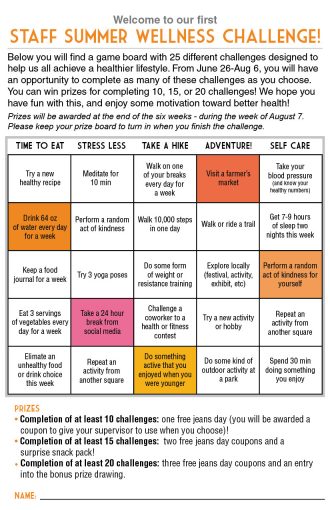Summer Wellness Challenge
The Centers for Disease Control and Prevention has classified obesity as an epidemic. Their response? “CDC’s obesity efforts focus on … strategies to make healthy eating and active living accessible and affordable for everyone.”
That last bit, “…accessible and affordable for everyone,” sounds as if a public library thought of it. It does, in fact, match the criteria for a Summer Wellness Challenge that the Kokomo-Howard County (Indiana) Public Library (KHCPL), is currently running for staff.
The handout has the look of a game board or bingo card, with topical column headings such as “Time to Eat” and “Take a Hike.” Somehow, the perky appearance and 25 extremely simple activities make it seem inviting, more like play than something the doctor ordered. Staff were given several challenge levels to choose from, ranging from 10 to 20 activities. The challenge is a pilot program; the goal is to see if the library should try something similar on a larger scale to raise wellness awareness and motivation in the community.

Image courtesy of Kokomo-Howard County Public Library.
Offering a range of activities that are accessible to all is more difficult than it may appear. Transportation, for example, may not be readily available to access a park or a farmer’s market. In response to the invisible barriers some participants might have, the highest level of completion is 20 out of 25 activities. This alleviates the stress of not having access to wearable fitness technology, a smartphone app, or even a pedometer for the “Walk 10,000 steps in one day” challenge or allows the person with osteoporosis to skip a challenge like “try three yoga poses.” The 25 activities selected were purposefully low-tech and readily achievable despite any number of personal differences including neighborhoods, income levels, and general health.
Because the pilot is being done with employees, it was easy to get additional information via a short survey. About two-thirds of the staff responded to the survey. In order to gain insight into their response one question asked was, “If you plan to participate, what is your primary motivation?” Of the choices provided, most want to be healthier, but significant percentages just thought it looked like fun or saw it as a positive team experience. (See pie chart below). Of respondents, 60 percent plan to participate in the challenge, 25 percent do not plan to participate, and 15 percent were undecided when they filled out the survey. We also learned that our staff is a great pilot group for the challenge in that 39 percent of them exercise only occasionally or never, so they have plenty of room for growth in developing healthy habits. Only 18 percent of respondents exercise four times per week or more.
An optional comment section of the survey was also enlightening. Some respondents made their choice to participate based solely on the rewards offered whereas others didn’t care about external incentives at all. Positive comments focused on the number of choices given, saw it as an alternative to workout videos, or emphasized that it was plain fun. They also emphasized the additional motivation it provided: “I am really enjoying this challenge. I have gotten back into some healthy habits that I had gotten out of. And I hope before it’s done, I add some new healthy habits.” One comment said, “Even if I don’t participate, I think it is a great idea.”
KHCPL’s tentative conclusions are as follows:
- More people are willing to choose healthy behaviors if the opportunities focus on something beyond health, e.g. their sense of fun or their desire to be a team player.
- Freedom of choice is an appealing element in wellness activities.
- Incentives that are perceived as valuable will net some wellness efforts, at least while the incentives are offered.
Once the Wellness Challenge has ended, KHCPL will assess whether something as simple as a grid of suggested activities could help to motivate community residents to improve their wellness.
Resources
Tags: community health, fitness programs at the library, health and fitness, health programming, staff wellness







